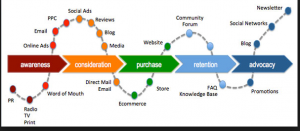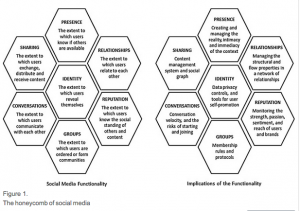There are several risks that may arise when using social networking sites which users may tend to ignore. These are described below.
Identity theft (IT) – IT is one of the major concerns related with social media. So much information is provide by the individual on these platforms that it is obvious to guess the rest of the information, which leads to identity theft which is further used to commit cyber crime such as fraud.
Sexual Predators – Once again due to disclosure of a lot of confidential information on the webpage, sexual predators are one of biggest concerns faced by social media website. As an individual could easily hide their true identity and target young vulnerable children who are not capable to distinguishing if an individual is legit or a sex predator.
Stalking – Staking is something which raises alarm again and again and is something which is faced by social media website on a regular basis. As individuals cannot see if anyone is looking at their personal information such as pictures or videos it makes it so much easier for a stalker. Even though the majority of the big social media website are providing a lot of facilities to privatise your personal profile there will always be slight chance of stalking.
Unintentional Fame – This is also very lethal form of harassment. This kind of situation occurs when the picture, video or piece of music created by an individual is sent around on social media websites without their consent. As a result of such harassment many young teenager have committed suicide. Once again social media websites have provided the user with the facilities to report such contents which can be cause such circumstances and miXXers will do the same on its site.
Employment concerns – Personally I believe social media platforms and employee do not mix together. This is an issue of many organisation and their employee. This issue has been raised and talked about numerous time by academic research. A lot of individual have lost their job due to uploading inappropriate information regarding working, personal information or information about desecrate circumstance about certain individual, inappropriate images or videos and many more.
Online harassment – This is something which is commonly seen in teenage groups, where teenage are victimised because of their physical appearance , ethnic background etc. This is an extremely serious issue as it can lead to fatal circumstance, this also leave negative impact of social media platform as they are created to keep in touch with family and friends socially rather than for bullying and harassment. (Wikipedia.,2015.)
Privacy Concerns – Privacy of confidential information about an individual has always been a major concern for many year. Due to the fast improvement in the technology and availability of data, this concern is increasing as an individual can share large amount information about their themselves or other without even realising via single click.
According to Acquisi and Grossklags (2007) privacy choices are affected by incomplete and asymmetric information which is defined by ‘bounded rationality ‘. In addition ignorance is rationalised (rational ignorance) because users may consider that truly learning about and understanding privacy implications and acting on that knowledge would actually outweigh the benefits of ignoring the risks.
A lot of personal information such as date of birth, contact details, employment and education history information is broadcasted in Facebook which can easily be for unlawful purposes.
Individuals are sharing their current location via Facebook chat. This can be extremely dangerous as teenager or pre teenagers can leave their current location on which can result in stalker or sex predators follow them and the result of that could be fatal. Here the ‘Valence Effect’ outlined by Acquisi and Grossklags (2007) can be seen to be in effect as a behavioral anomaly as users over-estimate that there will only be a positive effect.
This is something which has been highlighted via a board of member at the university. University students taking pictures of each other or members of staff and uploading them online without their consent.
Invasive privacy agreement is something which always catches the attention of law abiding citizens. This agreement means that an individual is agreeing that all the information which they upload on the website such as their confidential information including pictures and videos are property of the service provider, which seems a bit odd.
There are thousands of agencies which are standing in the queue to retrieve confidential information regarding individual, in order to understand individual behaviour better. Recently, Twitter has admitted that they were scanning the telephone numbers of their customers in order to understand their behaviour better without their consent. This shows there is a lot more going on behind the scenes without your knowledge. It hints at another behavioural anomaly from Acquisi and Grossklags (2007) that users are ‘over confident’ in their knowledge and ability to actually protect their privacy. There are no technologies easily available to users that lets them delete all confidential information about themselves from internet. (Wikipedia.,2015.) There is also essentially a Privacy Paradox (Zafeiropoulou M 2013 et al) because though users may say they are not willing to share information on these sites in practice they still do it. This helps to highlight that despite the dangers that may arise in using these sites, even when aware of them users still usually decide to use them.
Reference:
Acquisi and Grossklags. What Can Behavioral Economics Teach Us About Privacy?, Digital Privacy: Theory, Technologies and Practices Auerbach Publications (Taylor and Francis Group) pp. 363-377 (2007)
Wikipedia.,2015. Privacy concerns with social networking services. Available from:http://en.wikipedia.org/wiki/Privacy_concerns_with_social_networking_services#Privacy_Concerns [Accessed on 23th april 2015]
Wikipedia.,2015.Privacy issues of social networking sites. Available from:http://en.wikipedia.org/wiki/Privacy_issues_of_social_networking_sites [Accessed on 23rd april 2015]
Zafeiropoulou, Aristea M., Millard, David E., Webber, Craig and O’Hara, Kieron (2013) Unpicking the privacy paradox: can structuration theory help to explain location-based privacy decisions? In, ACM Web Science 2013 (WebSci ’13), Paris, France, 02 – 04 May 2013.



